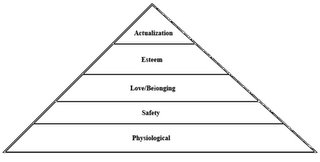Transfer-Wk 16,Thurs.-Maslow’s hierarchy of needs

There hasn’t been too much activity on my blog this week has there?
Ironically, life has gotten in the way of my efforts to improve my life. Stuttering has, for the time being at least, become irrelevant when compared to a baby on the way, and being under the gun on a project I’m working on. Also, due to my working from home, stuttering with people outside is not even very intrusive.
Obviously, my stuttering is devastating at times, like when I’m unemployed. But at other times, like when I’m programming in ‘the zone’, under a deadline, or playing soccer with my son, it doesn’t even occur to me to think about it.
So why is that? While thinking about this, I remembered hearing about Abraham Maslow, and his hierarchy of needs, in our communications class in vocational school. At the time, I couldn’t understand why I was learning basic psychology, or how it would help me in my "soon to be" failed plumbing career. But 15 years later, I’m glad my communications teacher took the initiative. Thanks Mr. Fraser.
So why is it, my stutter is so devastating at times and not others? Could it be related to which need I was currently focusing on, and its effect on each level of the hierarchy? Where does Stuttering fit into Maslow’s hierarchy of needs?
Physical needs & safety levels
I think it may have an effect when you are unemployed since it hits you right at the physical needs & safety levels. At these levels, being disadvantaged by a stutter can be especially devastating. Stuttering can be a impossible barrier between you and your needs rather than a minor obstacle.
Love/Belonging needs
While feelings of rejection may be hurtful, they are not as bad as the feeling that you may never find another job. However, these feelings may cause reclusive behavior, anti-social habits, and a generally incomplete lifestyle. The stutterer may chose to live alone since basic courtship rituals can be so demoralizing.
Esteem needs
At the next higher level, a stutterer may suffer from esteem issues and/or an inferiority complex. Health, career, finances, and personal relationships may suffer because of it. Recognition may not be sought, because the spotlight (even praise) brings with it the fear of embarrassment. Others may capitalize on this at the stutterers expense.
Self-actualization
A stutterer may not follow their passion into the industry which would capitalize on their best strengths. As a result they may feel unfulfilled for a lifetime.
Personally, I did not pursue my passion into the industry, which I have the strongest interest in, because of my stutter. Ironically, the of computer programming which has a stereotype of being a solitary endeavor, has left me unemployed many times because I couldn’t get past the interview scheduling phone call.
I suppose the effects of stuttering can be felt at every level, with the lowest levels being the most detrimental. Recently, I’ve seen darker things where a stutterer has felt absolutely overwhelmed with depression and suicide. How could these extreme effects fit into Maslows Pyramid?
Disclaimer – I’m not a psychologist (not even an amateur), please take anything I’ve said above with a grain of salt. It will likely be revised later.
Not meant as advice, please find a qualified therapist if you are interested in similar therapy.


2 Comments:
John,
Interesting topic regarding stuttering as it relates to Maslow's hierarchy - (I started college as a Psych major, but switched to Accounting when I found out that was where the hot girls were!)... Interesting enough that I may blog off of it in a few days based on something you said...
Rob
Thanks Rob,
I started the post with nothing to say actually, then got caught up in the Maslow thing.
To be honest though, I'm not sure if I will want to edit it tomorrow though. I've got a feeling I might.
And I'm glad it sparked some ideas for you.
Regards,
John
Post a Comment
<< Home